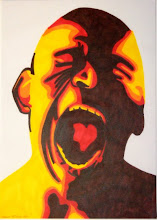
American Gangster {Ridley Scott, 2008}
I'm ace-in-the-hole sure this film has been chalked up in an insufferable amount of film criticism blogs. It's wet out of the womb, and so therefore, I'm going to let it grow into itself before I snip its umbilical cord or sever it's foreskin without its consent.
Still, though, I think it is appropriate to apply some first impressions, in order to compare them to my later opinions.
Pluses:
1) Russell Crowe. Typically great actor. Sort of unilateral. Not very Jewish. Not very good at faking a Jersey accent. Perfectly acceptable as a 2007 interpretation of Frank (Paco) in Serpico without the beatnik-vibe or the accusations of sexual deviancy.
2) Denzel Washington. Typically great actor. Sort of unilateral. Not usually a screen devil (though the opening shot of the film nullifies the extremes of his murderous actions for the remainder of the film, simply by surmounting them with the live cremation and execution of an anonymous victim right away.) Very very good at acting the role of a harlem-ite, as well as a noble man within the confines of poverty. Convincing as hell as any form of black activist, from the legitimate influence of Malcolm X, to the felonious impact of a corrupt drug czar or mob boss, just like Fred Williamson in Black Caesar.
3) Ridley Scott did good. Some of his shotwork was brilliant (directional parallels/ orchestrated composition i.e. the plane crossing behind several street markers). Chiwitel Ejiofor (Children Of Men) masks his anglo-speak exceptionally in playing the flashiest brother of co-protagonist Frank Lucas, just as Josh Brolin masks his tendency towards unintentional overacting exceptionally (see Hollow Man and the television series Into The West for reference) in his portrayal of the prick cop in the film who's' the most blatantly "on the take" (a la Serpico) from the criminal bankroll.
Minuses:
1) Hip-hop's big fat nose in this film is quite visible, especially the nose of America's modern hip-hop. This pitfall again seems acutely typical of the implicated 'trappings' that a white (in this case germanic) director faces in making a 'black' film that will inevitably draw a heavier 'black' audience. In an attempt to appease what is currently a ghetto-vitalized populous, the allowance of sluggish, cavorting, badly performed cameos by music media figures (like rapper T.I. [though, not really too shabby] and RZA (who cooly sports his poorly disguised Wu-Tang Clan tattoo no less than a foot away from the camera in one or two shots) drowns what credibility the filmmaker build up. These ego-insertions cripple the work as a strong piece that communicates skillfully among more diverse audiences.
The use of this tactic of "filling out the molds of a type of racial film," to me seems counterproductive. In an attempt at cinematic egalitarianism, why further ostracize, as well as distract more major audiences, by choosing instead to only appeal to an informed, select few attentive to your central subject's racial disposition? If Frank Lucas ever stuck out loudly as a "black man in the white man's world" it was certainly made the loudest in this film.
I guess because I'm more versed in civil rights than the prototypical moviegoer I can cast down these judgments more easily believing I am above the common viewer.
This does not, however, discard the fact that instrumental constructs that often strengthen racism, nationalism, and the West's lust for economic individuality and privatization, are further fortified by the modes and ethics of this film.
2) New York is ___________ this close to being dead as a setting. It is now ___ this much closer.
Conclusion:
If a stage rendition of Black Caesar played in a broadway double-up with a rendering of Serpico, then American Gangster would be appraised as a lousy film rendition of the broadway hit that featured a goody two-shoes cop running down a self-made black mafioso. The papers might say "the camera work and special effects were nice though."

No comments:
Post a Comment